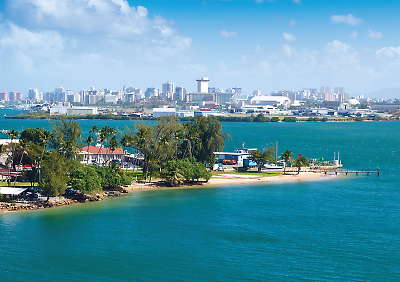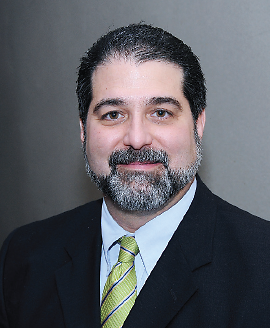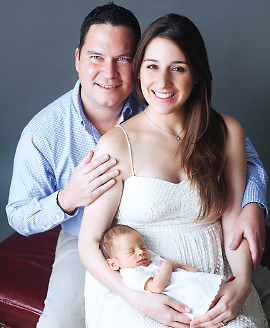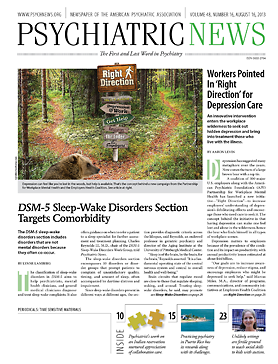Anyone who has vacationed on the island of Puerto Rico was undoubtedly enthralled by Flamenco Beach; Mosquito Bay, where the water glows aquamarine by moonlight; the lush El Yunque rainforest; and the Spanish colonial buildings in Old San Juan.
But what would it be like to live in Puerto Rico and practice psychiatry there? Splendid in many ways, psychiatrists who are natives of Puerto Rico attest. Yet it is not without serious challenges, they add.
“It is spring all year; the beaches are only 30 minutes away!” Juan Fumero, M.D., reported during a recent interview with Psychiatric News. In addition to being an adult psychiatrist in private practice in Puerto Rico, Fumero is on the medical faculty of one of the two major psychiatric hospitals in Puerto Rico.
“Our island is composed of different cultures—native, and a lot of influence from Europe and the United States,” said Fumero. “So we are very diverse. And this diversity adds to our enjoyment in working with patients.”
“We Puerto Ricans tend to be social, to spend a lot of time with our extended families, and to receive a lot of support from them,” Lelis Nazario, M.D., chair of psychiatry at the University of Puerto Rico, commented. “I also like our warm climate and the beaches. I loved living in Boston during my psychiatry residency, but I couldn’t take the weather!”
When you treat patients in Puerto Rico, you also get to know their families and sometimes even their neighbors when family members or neighbors accompany them to doctor visits, observed William Julio, M.D. Julio is a geriatric psychiatrist and treasurer of the Puerto Rico Psychiatric Society. “Around Christmas, they will bring you fresh fruits or vegetables from their gardens. It is one of the pleasant things about treating patients here.”
Fumero also noted that there are “many academic activities for psychiatrists and other health professionals. Also, we have several research centers that create an opportunity to obtain Hispanic data about mental disorders. Such data are particularly valuable in light of the growing Hispanic population in the United States.”
Resources Can Be Lacking
Puerto Rican psychiatrists could, however, benefit from more resources, Julio indicated. “When I was doing my residency in New York City, there were many resources for patients and so many professionals working in an interdisciplinary way.” That is not always the case in Puerto Rico.
Fumero concurred: “We lack specialized care for conditions such as dual diagnoses and eating disorders. We only have a couple of psychiatry training programs, so we don’t have enough psychiatrists. There are probably around 450 of us on an island with some 4 million people.”
Because of a paucity of funds, “it is difficult to hire psychiatrists in an academic environment,” Nazario noted.
Managed care constraints are also a big headache for psychiatrists in Puerto Rico, Anisssa Hernandez, M.D., asserted. “I don’t feel that I can practice freely, because a third person is telling me how to do it.” Hernandez completed her psychiatry training eight years ago. Today she is in private practice and affiliated with psychiatric hospitals in Puerto Rico.
Julio has the same complaint about dealings with managed care. Most of his patients are enrolled in the Medicare Part C Program, which is essentially managed care Medicare. Consequently, he noted, he often has difficulty obtaining authorization to give patients medications or to hospitalize them.
Moreover, reimbursement by Medicare, Medicaid, and health insurance companies is lower in Puerto Rico, a U.S. territory, than in the rest of the United States for the same type of treatment, Julio pointed out. “As a result, many of our psychiatrist colleagues have moved to the mainland to practice.” And it is not just psychiatrists, but other types of physicians in Puerto Rico who are frustrated by the difficulties of practicing on the island, Fumero added.
Discrimination a Long-Time Problem
Indeed, discrimination has been a problem in Puerto Rico for 500 years, ever since it was a colony of Spain, then of France, then of Holland, and finally of the United States, Hernandez observed.
“And when you are subjugated and don’t feel free century after century, that leads to underlying anger, aggression, and depression,” she continued, adding that that is evidenced in her patients. “I have observed in my patients how frustrated and disappointed they are by how things are working” on the island, she said.
Another stressor for the people of Puerto Rico is a rising crime rate, Fumero reported. “Many people are afraid, and that just adds to the economic and domestic stressors they are already facing.” There are several reasons for this rising crime rate, Julio explained. One is that efforts to secure the U.S. border with Mexico to prevent the illegal entry of drugs have led to drugs being trafficked through Puerto Rico instead. Another reason is that the unemployment rate in Puerto Rico is high—14 percent or 15 percent, about twice that on the U.S. mainland.
The health care reform law could also have an effect on psychiatric care on the island, Nazario said, since “if it affects people in the United States, it will affect us.” For instance, if it leads to lower reimbursement rates for psychiatrists, it would be especially hard on Puerto Rican psychiatrists since their reimbursement rates are already low.
“I think the act will impact Puerto Rican psychiatrists who are not board certified, and many are not,” said Julio. “The reason why is that after 2015, if you are not board certified, you will not be able to bill Medicare or Medicaid.”
Regardless of the impact of the Affordable Care Act on Puerto Rico, the Puerto Rican health care system should be revised, Hernandez maintained. If she could change only one thing about practicing psychiatry in Puerto Rico, it would be to “change the system,” she said. “We need a system that allows psychiatrists and health care professionals to practice without having insurance plans interfering.”
But even with these hurdles, Puerto Rican psychiatrists love their island, their people, and especially helping their patients. As Hernandez stated, “I try to give them hope, to show them that they have the power within themselves to construct a better world.” ■



